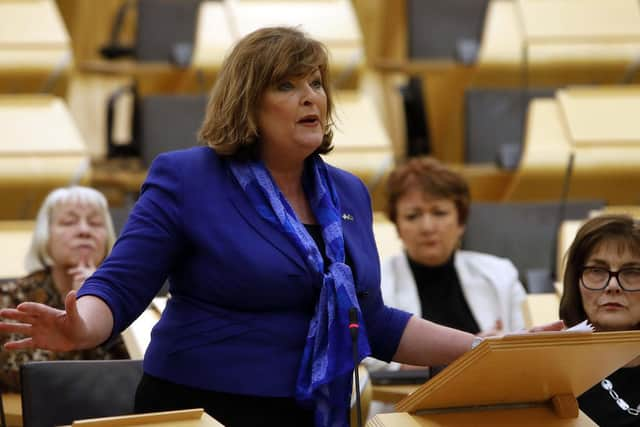How Scotland's new culture strategy can transform lives for the better – Fiona Hyslop


A ballet class helps Parkinson’s sufferers to improve their co-ordination and balance.
A residential course on Gaelic music inspires young people to learn about their heritage.
Advertisement
Hide AdAdvertisement
Hide AdAn open mic night at a community arts centre gives aspiring poets the confidence to try out their material – and sets some on a path to a new vocation.


As Culture Secretary for the past 10 years, I have heard time and again stories like these – of people across Scotland using culture to transform, inspire or enrich their lives.
They are just some of the voices at the heart of A Culture Strategy for Scotland. The strategy will strengthen culture by strengthening the status, recognition and the support for artists and performers who inspire, bring joy and challenge us by creating great art.
Launched this week by the Scottish Government, this is the first such strategy to be produced in a generation, acknowledging the central place culture must have in society and government.
Culture has a value in and of itself – it is worth so much more than any financial figure that could be placed on it. Of course, its economic value is indisputable: according to the latest Scottish Government economic models, in 2016 the creative industries supported around £9 billion of activity and 100,000 jobs in the wider Scottish economy. Culture also defines who and what we are: how we talk, think and treat each other.
Transforming lives
Recognising this, we started a national culture conversation a couple of years ago, talking to artists, musicians, communities and organisations – from small historical societies to national performing companies – about what matters most to them.
We heard from The Stove venue in Dumfries, which works with local people and community groups to run accessible arts events and activities, and from a National Museums Scotland project providing monthly social events for people with dementia.
And, of course, there were the individual stories of people who found that culture helped them to discover a new direction in life or even learn to cope with health issues.
Advertisement
Hide AdAdvertisement
Hide AdThe responses we received allowed us to identify the barriers faced by the cultural sector and the strategies for breaking them down, helping us to set the future direction for supporting culture in Scotland.
The result is A Culture Strategy for Scotland – a document which seeks to harness culture’s ability to strengthen, transform and empower lives for all of Scotland.
A driving force of the strategy will be the National Partnership for Culture, a new advisory group independently chaired by the former Edinburgh International Festival managing director Joanna Baker. This group will advise Ministers on matters affecting culture, as well as helping us to deliver the ambitions at the core of the Culture Strategy.
Fostering international collaboration
There are three such ambitions, supported by almost £1.25 million for new and existing programmes and initiatives.
First, we want to strengthen culture – developing the conditions and skills for it to thrive, supporting creative people in their vital contribution to society and the economy, and fostering international collaboration.
We will do this through initiatives including the Arts Alive programme, which will bring up to 250 cultural sessions and five artist residencies to schools and communities. We will be giving this project £280,000 to carry it through into 2021.
We’ll take steps to increase diversity by providing £40,000 to Museum Galleries Scotland for its Skills for Success programme, where volunteers from a range of backgrounds are set on the path to achieving an accredited qualification. We’ll continue to press the UK Government for changes to immigration and trade issues – to ensure, for instance, that international musicians, comedians and artists can come to Scotland and help make our festivals the envy of the world.
Second, we want to transform through culture. Music shouldn’t be confined to concert halls; visual art isn’t just for galleries – culture should be central to decisions in health and wellbeing, education, the economy and the environment.
Advertisement
Hide AdAdvertisement
Hide AdTo make this happen we will work across government to place culture as a central consideration in all policy areas, while continuing to collaborate with organisations from the culture sector and beyond, for instance through an Arts, Culture, Health & Wellbeing Scotland Network, which is being expanded through £10,000 of Scottish Government funding.
We will help schools to engage more with the arts through the Supporting Expressive Arts in the Curriculum programme, which has been funded to the tune of £15,000. And we will use visual arts to help communities understand the impact of climate change.
Young people at risk of re-offending
Our third ambition is to empower through culture, celebrating it as part of every community – essential to our lives and wellbeing. To achieve this we are working with Creative Scotland to map councils’ support for culture, and collaborating with culture trusts and local authorities to improve provision at a local level.
Not everyone is able to benefit from culture equally. Our Creative Communities programme, match-funded this year by the Justice portfolio, will provide experiences for people in areas with lower levels of cultural engagement, including projects for young people at risk of re-offending, and has been allocated £900,000 in total up to 2021.
Our vision is of a nation where culture is woven through everyday life, where it shapes – and is shaped by – society, and where its transformative effects are experienced by everyone. With the initiatives outlined here and more, I look forward to making that vision a reality in Scotland.
Fiona Hyslop is the Cabinet Secretary for Economy, Fair Trade and Culture and SNP MSP for Linlithgow
Comments
Want to join the conversation? Please or to comment on this article.
